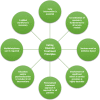ANZAED eating disorder treatment principles and general clinical practice and training standards
- PMID: 33292546
- PMCID: PMC7653831
- DOI: 10.1186/s40337-020-00341-0
ANZAED eating disorder treatment principles and general clinical practice and training standards
Abstract
Introduction: Eating disorders are complex to manage, and there is limited guidance around the depth and breadth of knowledge, skills and experience required by treatment providers. The Australia & New Zealand Academy for Eating Disorders (ANZAED) convened an expert group of eating disorder researchers and clinicians to define the clinical practice and training standards recommended for mental health professionals and dietitians providing treatment for individuals with an eating disorder. General principles and clinical practice standards were first developed, after which separate mental health professional and dietitian standards were drafted and collated by the appropriate members of the expert group. The subsequent review process included four stages of consultation and document revision: (1) expert reviewers; (2) a face-to-face consultation workshop attended by approximately 100 health professionals working within the sector; (3) an extensive open access online consultation process; and (4) consultation with key professional and consumer/carer stakeholder organisations.
Recommendations: The resulting paper outlines and describes the following eight eating disorder treatment principles: (1) early intervention is essential; (2) co-ordination of services is fundamental to all service models; (3) services must be evidence-based; (4) involvement of significant others in service provision is highly desirable; (5) a personalised treatment approach is required for all patients; (6) education and/or psychoeducation is included in all interventions; (7) multidisciplinary care is required and (8) a skilled workforce is necessary. Seven general clinical practice standards are also discussed, including: (1) diagnosis and assessment; (2) the multidisciplinary care team; (3) a positive therapeutic alliance; (4) knowledge of evidence-based treatment; (5) knowledge of levels of care; (6) relapse prevention; and (7) professional responsibility.
Conclusions: These principles and standards provide guidance to professional training programs and service providers on the development of knowledge required as a foundation on which to build competent practice in the eating disorder field. Implementing these standards aims to bring treatment closer to best practice, and consequently improve treatment outcomes, reduce financial cost to patients and services and improve patient quality of life.
Keywords: Clinical practice; Dietetics; Dietitian; Eating disorder; Mental health professional; Psychological; Standards; Training; Treatment.
Conflict of interest statement
Not applicable.
Figures
References
LinkOut - more resources
Full Text Sources


